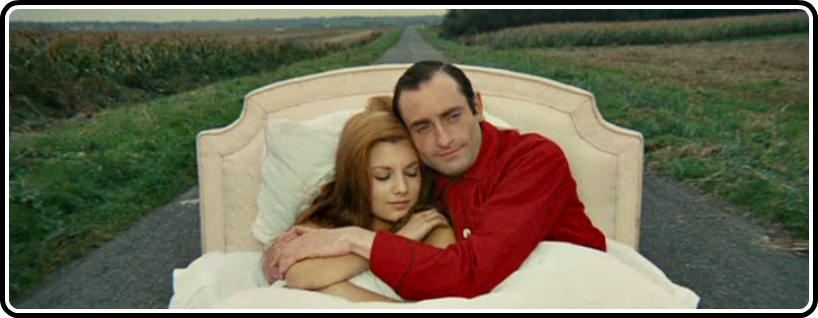
As far as it’s current theatrical revival is concerned, I’m a bit tardy in submitting this short review of Le Grand Amour, the last of the five feature films directed in the 1960s by French director/writer/clown Pierre Etaix before he shifted his focus mostly to his acting career, which continued at least up to 2011 with his appearance in Aki Kaurismaki’s Le Havre. That’s because the film just completed its run at Portland OR’s Northwest Film Center this past weekend (with a few more retrospectives planned for other cities, later this spring and summer.) But it’s not too late for me to contribute to the growing anticipation of the new Pierre Etaix box set that Criterion will release next Tuesday, April 23. This site has already featured write-ups of two other full-length titles that will be released there, both (As Long As Your Healthy and Yoyo) quite positively received by Scott Nye and me, respectively. I’m here to let you know that, without having seen any of the other shorts and features included in it, my enthusiasm for grabbing my own copy of Pierre Etaix could not be any higher. Le Grand Amour offers enough in the same vein as Yoyo (sharp but genteel humor that sneaks up on me, wrapped up in deftly executed cinematic trappings) to make me feel right at ease in Etaix’s world, while tossing in some intriguing new elements, such as color film, and a more modern late 60s setting informed by significant tectonic shifts that had taken place in the sexual and cultural revolutions of even a few short years in that tumultuous era.
If a quick, first-glance comparison must be made, I suppose that I’ll have to concede that Yoyo is the greater film of the two Etaixs that I’ve seen, with a broader historical sweep and a more comprehensive demonstration of filmmaking mastery. But there’s no doubt that Le Grand Amour affected me more on a personal level, as I found the lead character of Pierre much more like myself than either the clown Yoyo or his over-indulged, idly rich father, “le millionaire.” Pierre is that most common of stock movie characters, the middle aged man settled down into a comfortable but blandly predictable marriage-and-career situation… the kind of petit bourgeois comforts that seem to represent the good life to many people, but have the effect of draining vital energies over the course of a decade or two. We watch almost helplessly as Pierre settles into the domestic straitjacket imposed on him by Florence, his pleasant but unadventurous wife and dutifully puts in the years required of him in upper management of his father-in-law’s successful business before eventually ascending to the inheritance that awaits him. There’s nothing all that objectionable or unpleasant about his life; indeed it seems quite callous, with a little objective distance, to specify anything worth complaining about in Pierre’s lot – and yet, I can bemusedly relate to the doldrums he finds himself in, and I don’t think I’m all that unique among potential viewers of Le Grand Amour.
As so often happens then, in these kinds of set-ups, Pierre suddenly finds himself smitten by the intrusion of a vivacious young woman into his hermetically sealed order of life. In this instance, she’s Agnes, the charming young secretary, possessed of a sparkling smile, a trim figure and flowing hair of a strawberry blonde hue. Agnes doesn’t do anything beyond the pleasant execution of her secretarial duties to set Pierre’s ardor aflame, but at his pivotal stage of life, sometimes all it takes is the winsome tilt of a head and the apparent availability of an attractive girl to get his imagination going. And what an imagination Pierre possesses. Or perhaps I should just give credit where it belongs, to Etaix, who finds a discreetly tasteful way to illustrate the lust-fueled fancies that a lot of us guys might express in a decidedly more carnal, less whimsical manner in line with the explicitly vulgar sensibilities of our times.
The clip, occurring roughly in the middle of Le Grand Amour, makes overt references to Jean-Luc Godard’s Weekend, itself a Criterion release from last year, though with a warmer, less caustic touch. In the context of the whole film, it’s a fairly minor sequence, hardly climactic in its significance, but possessed of enough sheer poetic beauty, so evocative in its depiction of fanciful but ultimately misdirected erotic daydreaming to become the scene most emblematic of what Etaix communicates throughout. As such, Le Grand Amour is an effective piece of entertainment that’s also capable of serving as a witty reflecting pool for couples of a certain age to look into, if they’re fearless enough to not blink at what they might see staring back at them… and a fair forewarning to younger romantics who have yet to enter the perilous realms of wondering and wandering that a “great love” will eventually propel most of us into, if we just stick with it long enough.
Le Grand Amour played at the Northwest Film Center on Friday, April 12th and Sunday, April 14, 2013. Check nwfilm.org for more information.



